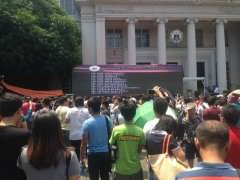
“Any act that undermines the safe and orderly conduct of the Oath-Taking Ceremonies or disturbs the due decorum therefor shall be punished with direct contempt of court, and shall be dealt with summarily,” read the SC notice signed by Bersamin.(PNA photo)
MANILA — A total of 1,724 new lawyers are set to take their oath on Friday at the Philippine International Convention Center (PICC) in Pasay City.
Associate Justice Lucas P. Bersamin, chairperson of the 2017 SC Committee on the Bar exams, reminded the bar passers and guests to behave properly during the oath-taking ceremony on June 1 at 2:30 p.m..
“Any act that undermines the safe and orderly conduct of the Oath-Taking Ceremonies or disturbs the due decorum therefor shall be punished with direct contempt of court, and shall be dealt with summarily,” read the SC notice signed by Bersamin.
“In this regard, the Supreme Court Security Officials and Personnel are deputized to ensure the safe and orderly conduct of the Oath-Taking Ceremonies, and their duly designated personnel are expressly authorized to prevent or reprimand any violations of the orderly conduct of the Oath-Taking Ceremonies,” Bersamin added.
A total of 1,724 out of the 6,748 examinees who took the examinations passed, translating to a passing rate of 25.5 percent of the total examinees.
Bersamin said the number of examinees for 2017 was the highest so far as compared to the past two years.
He, however, noted that the percentage of passers this year is lower compared to 59.06 percent or 3,747 out of 6,344 examinees who passed the 2016 Bar Examinations and 26.21 percent of 1,731 out of 6,605 examinees who passed the 2015 Bar Examinations.
Mark John Simondo, an alumnus of the University of St. La Salle in Bacolod topped the 2017 Bar Examinations, with a high score of 91.05 percent.
Simondo was followed by three other provincial law graduates – Christianne Mae Balili, of University of San Carlos in Cebu, in second place (90.80 percent); Camille Remoroza, of the Ateneo De Davao University, in third place (90.70 percent); and Ivanne D’laureil Hisoler, also from University of San Carlos, in fourth place (89.55 percent).
Meanwhile, San Beda College-Manila alumna Monica Anne Yap garnered fifth place (89.
45 percent). At sixth place is University of Santo Tomas (UST) law graduate Lorenzo Luigi Gayya (89.10 percent). Another University of San Carlos graduate, Rheland Servacio, placed seventh (89 percent) while Krizza Fe Alcantara – Bagni of St. Mary’s University in Nueva Vizcaya placed eighth (88.90 percent).
UST alumni Klinton Torralba and Emma Ruby Aguilar got the ninth and tenth place, with a rating of 88.65 percent and 88.40 percent, respectively.
Lyan David Juanico and Lougenia Cariño, both from San Beda College – Manila, placed 11th and 12th; Arman Joseph Guzman, of UST, placed 13th; Jewelle Ann Lou Santos, of Ateneo De Manila University, placed 14th; while Stephanie Claros, of University of San Jose – Recoletos in Cebu; Rhea Doll Gonzalo, of Xavier University in Cagayan De Oro City; and Nadia Christine Mendiguarin, of Saint Louis University in Baguio City, were tied at 15th place.
The other topnotchers, from 16th to 20th places respectively, were Eileen Carla Carpio, of San Beda University – Manila; Ella Mae Mendoza, of University of Cebu; Aecaya Christine Calero, of UST; Pretz Vernie Vinluan, of University of the Philippines; and Roniel Resurreccion, of Jose Rizal University.
The Bar Examinations are given annually in the course of one month, spread over four Sundays at a designated venue under the supervision of the SC.
It is the only professional licensure examinations which require the examinees to answer open-ended questions written in long hand. These questions, formulated by the bar examiners for each subject and selected personally by the Bar Committee Chair on the day of each examination, are formulated to test analytical ability, facility in expression in terms of written argument, comprehension of basic principles of law, and grasp of jurisprudence.
Due to the scope and difficulty, the bar examinations are regarded as the most prestigious professional licensure exam in the country. It is also the only licensure examination that is not administered by the Professional Regulations Commission (PRC).
The Bar Examinations are given only once every year at a designated venue under the supervision of the SC which designates an incumbent Justice to chair a committee consisting of eight examiners, one for each bar subject.
The exam covers Civil Law, Labor Law, Mercantile Law, Criminal Law, Political and International Law, Taxation, Remedial Law, and Legal and Judicial Ethics.
The Chair of the Annual Bar Examinations is given the discretion by the Supreme Court to choose the eight bar examiners who are considered as experts in their particular fields and, during the entire duration of the bar examinations, are bound by strict confidentiality.





















